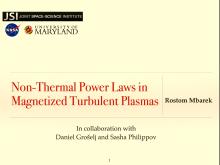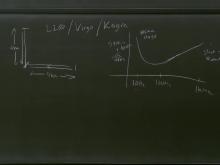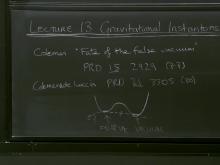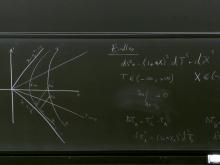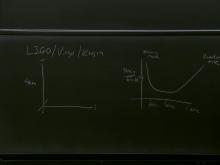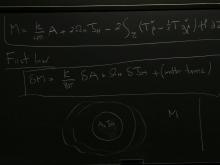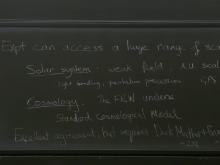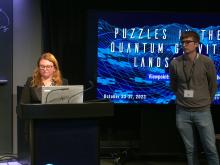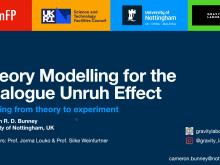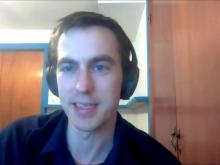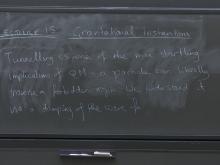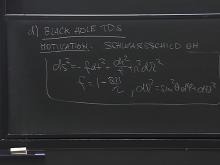Strong Gravity research at Perimeter Institute is devoted to understanding both the theoretical and observational aspects of systems in which gravity is very strong (i.e., spacetime is highly curved or dynamical],. On one hand, this means studying extreme astrophysical systems, like black holes and neutron stars, as well as making and testing predictions for existing and forthcoming gravitational wave detectors, electromagnetic telescopes, and particle astrophysics experiments. On the other hand, it also includes a range of non-astrophysical topics, such as the instabilities of higher-dimensional black holes or the dynamics of strongly-coupled quantum field theories (via holography). The goal of strong gravity researcher is to test the validity of Einstein's theory of gravity, constrain proposed alternatives, understand the most extreme astrophysical systems, and investigate the ways in which highly curved or dynamical spacetimes are linked with a range of other problems in fundamental physics.
Format results
-
30 talks-Collection NumberC25019
Talk
-

-

-

-

Black Hole Jet Sheath as a Candidate for the Comptonizing Corona
Navin Sridhar Stanford University
-

-

Workshop Talk
Luciano Combi Perimeter Institute for Theoretical Physics
-

Rethinking The Black Hole Corona as an Extended, Multizone Outflow
Lia Hankla University of Maryland, College Park
-

Quantifying flux rope characteristics in relativistic 3D reconnection simulations
Jesse Vos KU Leuven
PIRSA:25030133
-
-
Strong Gravity (Elective), PHYS 777, February 24 - March 28, 2025
13 talks-Collection NumberC25009Talk
-

Lecture - Strong Gravity, PHYS 777
William East Perimeter Institute for Theoretical Physics
-

Lecture - Strong Gravity, PHYS 777
William East Perimeter Institute for Theoretical Physics
-

Lecture - Strong Gravity, PHYS 777
William East Perimeter Institute for Theoretical Physics
-

Lecture - Strong Gravity, PHYS 777
William East Perimeter Institute for Theoretical Physics
-

Lecture - Strong Gravity, PHYS 777
William East Perimeter Institute for Theoretical Physics
-

Lecture - Strong Gravity, PHYS 777
William East Perimeter Institute for Theoretical Physics
-

Lecture - Strong Gravity, PHYS 777
William East Perimeter Institute for Theoretical Physics
-

Lecture - Strong Gravity, PHYS 777
William East Perimeter Institute for Theoretical Physics
-
-
Gravitational Physics (Elective), PHYS 636, January 6 - February 5, 2025
13 talks-Collection NumberC25004Talk
-

Lecture - Gravitational Physics, PHYS 636 [Zoom]
Ruth Gregory King's College London
-

Lecture - Gravitational Physics, PHYS 636
Ruth Gregory King's College London
-

Lecture - Gravitational Physics, PHYS 636
Ruth Gregory King's College London
-

Lecture - Gravitational Physics, PHYS 636
Ruth Gregory King's College London
-

Lecture - Gravitational Physics, PHYS 636
Ruth Gregory King's College London
-

Lecture - Gravitational Physics, PHYS 636
Ruth Gregory King's College London
-

Lecture - Gravitational Physics, PHYS 636
Ruth Gregory King's College London
-

Lecture - Gravitational Physics, PHYS 636
Ruth Gregory King's College London
-
-
Relativity (Core), PHYS 604, November 12 - December 11, 2024
14 talks-Collection NumberC24037Talk
-

Lecture - Relativity, PHYS 604
Ghazal Geshnizjani Perimeter Institute for Theoretical Physics
-

Lecture - Relativity, PHYS 604
Ghazal Geshnizjani Perimeter Institute for Theoretical Physics
-

Lecture - Relativity, PHYS 604
Ghazal Geshnizjani Perimeter Institute for Theoretical Physics
-

Lecture - Relativity, PHYS 604
Ghazal Geshnizjani Perimeter Institute for Theoretical Physics
-

Lecture - Relativity, PHYS 604
Ghazal Geshnizjani Perimeter Institute for Theoretical Physics
-

Lecture - Relativity, PHYS 604
Ghazal Geshnizjani Perimeter Institute for Theoretical Physics
-

Lecture - Relativity, PHYS 604
Ghazal Geshnizjani Perimeter Institute for Theoretical Physics
-

Lecture - Relativity, PHYS 604
Ghazal Geshnizjani Perimeter Institute for Theoretical Physics
-
-
Strong Gravity 2023/24
13 talks-Collection NumberC24023Talk
-

Strong Gravity Lecture
William East Perimeter Institute for Theoretical Physics
-

Strong Gravity Lecture
William East Perimeter Institute for Theoretical Physics
-

Strong Gravity Lecture
William East Perimeter Institute for Theoretical Physics
-

Strong Gravity Lecture
William East Perimeter Institute for Theoretical Physics
-

Strong Gravity Lecture
William East Perimeter Institute for Theoretical Physics
-

Strong Gravity Lecture
William East Perimeter Institute for Theoretical Physics
-

Strong Gravity Lecture
William East Perimeter Institute for Theoretical Physics
-

Strong Gravity Lecture
William East Perimeter Institute for Theoretical Physics
-
-
Advanced General Relativity (PHYS7840)
24 talks-Collection NumberC24001Talk
-
Gravitational Physics
13 talks-Collection NumberC24007Talk
-

Gravitational Physics Lecture - Zoom Only
Ruth Gregory King's College London
-

-

-

-

-

-

-

-
-
Puzzles in the Quantum Gravity Landscape: viewpoints from different approaches
34 talks-Collection NumberC23033Talk
-

Lessons of the Effective Field Theory Treatment of General Relativity
John Donoghue University of Massachusetts Amherst
-

Positivity Bounds and Effective Fields Theories (A Review)
Andrew Tolley Imperial College London
-

Holography and its implications for quantum gravity - VIRTUAL
Johanna Erdmenger University of Würzburg
-

-

Piecing Together a Flat Hologram
Sabrina Pasterski Perimeter Institute for Theoretical Physics
-

Open Discussion with today's speakers (Donoghue, Erdmenger, Montero, Pasterski, Tolley)
-
John Donoghue University of Massachusetts Amherst
-
Johanna Erdmenger University of Würzburg
-
Miguel Mlontero IFT Madrid
-
Sabrina Pasterski Perimeter Institute for Theoretical Physics
-
Andrew Tolley Imperial College London
-
-

Panel Discussion - Strengths and limitations of EFT (Donoghue, Knorr, Montero, Quevedo, Tolley)
-
John Donoghue University of Massachusetts Amherst
-
Miguel Mlontero IFT Madrid
-
Fernando Quevedo University of Cambridge
-
Carlo Rovelli Aix-Marseille University
-
Andrew Tolley Imperial College London
-
-

-
-
Quantum Simulators of Fundamental Physics
23 talks-Collection NumberC23019Talk
-

-

Simulating one-dimensional quantum chromodynamics on a quantum computer: Real-time evolutions of tetra- and pentaquarks
Christine Muschik Institute for Quantum Computing (IQC)
-

-

Five short talks - see description for talk titles
-
Barbara Soda Perimeter Institute for Theoretical Physics
-
Dalila Pirvu Invisible Technologies
- Leonardo Solidoro, Pietro Smaniotto, Kate Brown
-
-

First observations of false vacuum decay in a BEC
Ian Moss Newcastle University
-

Building Quantum Simulators for QuFTs
Jorg Schmiedmayer Technical University of Vienna
-

-

-
-
Gravitational Waves Beyond the Boxes II
15 talks-Collection NumberC22013Talk
-

Welcome and Opening Remarks
-
William East Perimeter Institute for Theoretical Physics
-
Reed Essick Canadian Institute for Theoretical Astrophysics (CITA)
-
Luis Lehner Perimeter Institute for Theoretical Physics
-
Daniel Siegel University of Greifswald
-
Suvodip Mukherjee Tata Institute of Fundamental Research (TIFR)
-
Huan Yang Tsinghua University
-
-

Measure the cosmic expansion history of the Universe using GW sources
Jonathan Gair Max Planck Institute for Gravitational Physics (Albert Einstein Institute)
-

Cross-correlation technique in GW cosmology
Benjamin Wandelt Institut d'Astrophysique de Paris
-

Matter in Extreme Conditions
Katerina Chatziioannou California Institute of Technology (Caltech)
-

Matter Effects in Waveform Models
Geraint Pratten University of Birmingham
-

Dark matter, PBHs, boson clouds
Salvatore Vitale Massachusetts Institute of Technology (MIT)
-

Multi-band GW observation from the third-generation detectors
Hsin-Yu Chen Massachusetts Institute of Technology (MIT)
-

-
-
PSI 2019/2020 - Gravitational Physics
15 talks-Collection NumberC20004Talk
-

PSI 2019/2020 - Gravitational Physics - Lecture 1
Ruth Gregory King's College London
-

PSI 2019/2020 - Gravitational Physics - Lecture 2
Ruth Gregory King's College London
-

PSI 2019/2020 - Gravitational Physics - Lecture 3
Ruth Gregory King's College London
-

PSI 2019/2020 - Gravitational Physics - Lecture 4
Ruth Gregory King's College London
-

PSI 2019/2020 - Gravitational Physics - Lecture 5
Ruth Gregory King's College London
-

PSI 2019/2020 - Gravitational Physics - Lecture 6
Ruth Gregory King's College London
-

PSI 2019/2020 - Gravitational Physics - Lecture 7
Ruth Gregory King's College London
-

PSI 2019/2020 - Gravitational Physics - Lecture 8
Ruth Gregory King's College London
-
-
PSI 2019/2020 - Relativity (Kubiznak)
15 talks-Collection NumberC19039Talk
-

-

PSI 2019/2020 - Relativity (Kubiznak) - Lecture 2
David Kubiznak Charles University
-

PSI 2019/2020 - Relativity (Kubiznak) - Lecture 3
David Kubiznak Charles University
-

PSI 2019/2020 - Relativity (Kubiznak) - Lecture 4
David Kubiznak Charles University
-

PSI 2019/2020 - Relativity (Kubiznak) - Lecture 5
David Kubiznak Charles University
-

PSI 2019/2020 - Relativity (Kubiznak) - Lecture 6
David Kubiznak Charles University
-

PSI 2019/2020 - Relativity (Kubiznak) - Lecture 7
David Kubiznak Charles University
-

PSI 2019/2020 - Relativity (Kubiznak) - Lecture 8
David Kubiznak Charles University
-
-
Magnetic Fields Around Compact Objects Workshop
30 talks-Collection NumberC25019 In the vicinity of neutron stars and black holes, where spacetime is strongly curved, magnetic fields can power many of the violent phenomena that we observe across the entire electromagnetic spectrum, from accretion and jet launching, to magnetar flares and pulsar emission. In the last decades, our theoretical understanding of the role of magnetic fields in these extreme environments has greatly improved through numerical simulations of magnetohydrodynamical fluids and charged kinetic particles; however, many open and important questions remain. Our observational capabilities and computational resources will keep growing dramatically in the next few years, allowing us to explore high-energy astrophysics in unprecedented regimes. Improving our knowledge of how magnetic fields, matter, and gravity interact with each other is a crucial piece in the new era of multimessenger astrophysics.
This workshop will gather experts from a wide range of disciplines within physics and astrophysics to present state-of-the-art advances in theoretical models of magnetic fields and high-energy plasma in different contexts, from neutron star mergers to supermassive black holes, and from micro scales to macro scales.
This workshop is sponsored in part by the Canadian Institute for Theoretical Astrophysics (CITA).
In the vicinity of neutron stars and black holes, where spacetime is strongly curved, magnetic fields can power many of the violent phenomena that we observe across the entire electromagnetic spectrum, from accretion and jet launching, to magnetar flares and pulsar emission. In the last decades, our theoretical understanding of the role of magnetic fields in these extreme environments has greatly improved through numerical simulations of magnetohydrodynamical fluids and charged kinetic particles; however, many open and important questions remain. Our observational capabilities and computational resources will keep growing dramatically in the next few years, allowing us to explore high-energy astrophysics in unprecedented regimes. Improving our knowledge of how magnetic fields, matter, and gravity interact with each other is a crucial piece in the new era of multimessenger astrophysics.
This workshop will gather experts from a wide range of disciplines within physics and astrophysics to present state-of-the-art advances in theoretical models of magnetic fields and high-energy plasma in different contexts, from neutron star mergers to supermassive black holes, and from micro scales to macro scales.
This workshop is sponsored in part by the Canadian Institute for Theoretical Astrophysics (CITA).
Scientific Organizers:
Luciano Combi (Perimeter Institute & U of Guelph)
Sean Ressler (CITA)
Bart Ripperda (CITA)
Luis Lehner (Perimeter Institute)
Will East (Perimeter Institute)
Gibwa Musoke (CITA)
Chris Thompson (CITA)
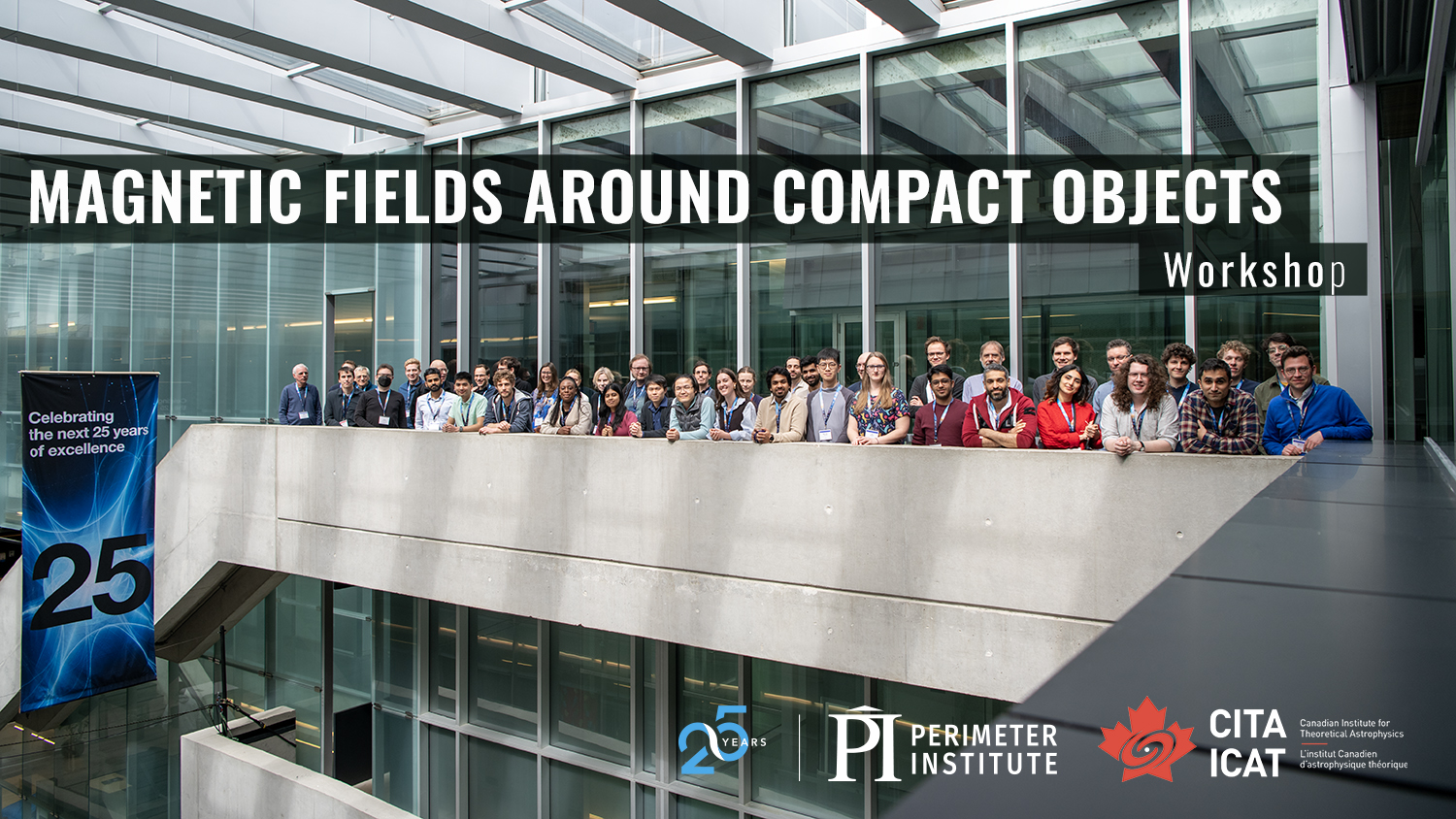
-
Strong Gravity (Elective), PHYS 777, February 24 - March 28, 2025
13 talks-Collection NumberC25009This course will introduce some advanced topics in general relativity related to describing gravity in the strong field and dynamical regime. Topics covered include properties of spinning black holes, black hole thermodynamics and energy extraction, how to define horizons in a dynamical setting, formulations of the Einstein equations as constraint and evolution equations, and gravitational waves and how they are sourced. Instructor: William East/Ghazal Geshnizjani Students who are not part of the PSI MSc program should review enrollment and course format information here: https://perimeterinstitute.ca/graduate-courses -
Gravitational Physics (Elective), PHYS 636, January 6 - February 5, 2025
13 talks-Collection NumberC25004The main objective of this course is to discuss some advanced topics in gravitational physics and its applications to high energy physics. Necessary mathematical tools will be introduced on the way. Instructor: Ruth Gregory/Aldo Riello Students who are not part of the PSI MSc program should review enrollment and course format information here: https://perimeterinstitute.ca/graduate-courses -
Relativity (Core), PHYS 604, November 12 - December 11, 2024
14 talks-Collection NumberC24037This course offers an introduction to general relativity (GR), focusing on the core principles of Einstein's theory of gravity. We will explore key topics such as the equivalence principle, some essential concepts in differential geometry, the Einstein-Hilbert action, and Einstein's field equations. Furthermore, we will examine practical applications of general relativity in understanding black holes, cosmology, and gravitational waves. Instructor: Ghazal Geshnizjani Students who are not part of the PSI MSc program should review enrollment and course format information here: https://perimeterinstitute.ca/graduate-courses -
Strong Gravity 2023/24
13 talks-Collection NumberC24023This course will introduce some advanced topics in general relativity related to describing gravity in the strong field and dynamical regime. Topics covered include properties of spinning black holes, black hole thermodynamics and energy extraction, how to define horizons in a dynamical setting, formulations of the Einstein equations as constraint and evolution equations, and gravitational waves and how they are sourced. -
Advanced General Relativity (PHYS7840)
24 talks-Collection NumberC24001Review of elementary general relativity. Timelike and null geodesic congruences. Hypersurfaces and junction conditions. Lagrangian and Hamiltonian formulations of general relativity. Mass and angular momentum of a gravitating body. The laws of black-hole mechanics.
Zoom: https://pitp.zoom.us/j/97183751661?pwd=T0szNnRjdUM2dENYNTdmRmJCZVF1QT09
-
Gravitational Physics
13 talks-Collection NumberC24007The Gravitational Physics course takes your knowledge and practice of gravity to the next level. We start by recapping the essential elements of differential geometry, adding some new techniques to the toolbox, then apply some of these methods to learning about submanifolds, extra dimensions, and black hole thermodynamics. Towards the end of the course, we delve into the frontiers, with a sample of recent research topics.
-
Puzzles in the Quantum Gravity Landscape: viewpoints from different approaches
34 talks-Collection NumberC23033Unraveling the quantum nature of gravity is one of the most pressing problems of theoretical physics. Several ideas have been put forward and resulted in a number of theories of quantum gravity. While these theories have explored different facets of the “quantum gravity landscape”, all viable approaches should ultimately make contact with observations, and answer exciting questions in cosmology and black-hole physics.
Sharing knowledge, exchanging ideas, and building a dictionary between different theories are crucial steps toward answering these questions, efficiently contrasting different theories, and ultimately reaching a deeper understanding of our Universe.
This conference will contribute to these goals by bringing together leading experts in different approaches to quantum gravity, gravitational effective field theory, black-hole physics, and cosmology. We will focus on specific puzzles in quantum gravity and their resolutions within different approaches. The conference will be highly interactive, with plenty of time to discuss common problems, understand the big picture, and develop novel connections between fields.Registration: Registration is now open, and both in-person and virtual participation is welcome. Online participants will be able to interact on an equal footing in question sessions and discussions. In-person attendance is limited and will be approved on a first-come, first-served basis. Talks are by invitation only, but in-person participants are encouraged to apply to present a poster.
Spam warning: There is an increasing number of scam agencies reaching out to conference speakers and attendees. Perimeter Institute does not use third-party agencies. We advise speakers and attendees to ignore emails and not to provide any details to anyone who is not from Perimeter Institute.
Confirmed Speakers and Panelists:
- Abhay Ashtekar (Penn State University)
- Robert Brandenberger (McGill University)
- Luca Buoninfante (Nordita)
- Xavier Calmet (University of Sussex)
- Francesco di Filippo (Kyoto University)
- Bianca Dittrich (Perimeter Institute)
- John Donoghue (University of Massachusetts)
- Astrid Eichhorn (CP3-origins)
- Johanna Erdmenger (Würzburg University)
- Ghazal Geshnizjani (Perimeter Institute)
- Ruth Gregory (King's College)
- Lavinia Heisenberg (Heidelberg University)
- Bob Holdom (University of Toronto)
- Benjamin Knorr (Nordita)
- Renate Loll (Radboud University Nijmegen)
- Miguel Montero (IFT Madrid)
- Rob Myers (Perimeter Institute)
- Sabrina Pasterski (Perimeter Institute)
- Fernando Quevedo (Cambridge University)
- Lisa Randall (Harvard University)
- Kasia Rejzner (York University)
- Mairi Sakellariadou (King's College)
- Lee Smolin (Perimeter Institute)
- Kellogg Stelle (Imperial College)
- Sumati Surya (Raman Research Institute)
- Andrew Tolley (Imperial College)
- Neil Turok (University of Edinburgh)
- Pedro Vieira (Perimeter Institute)
- Yasaman Yazdi (Imperial College)
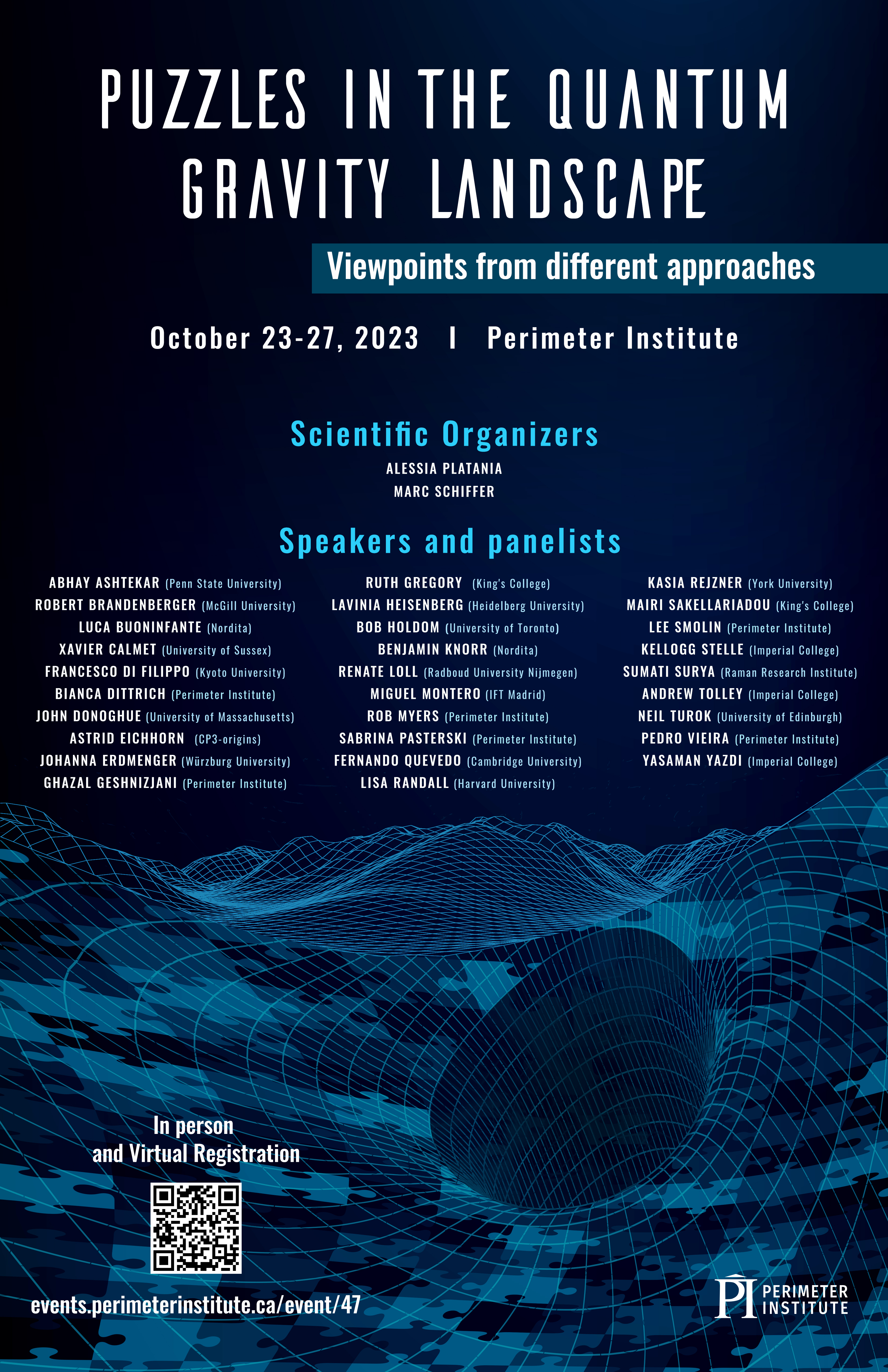
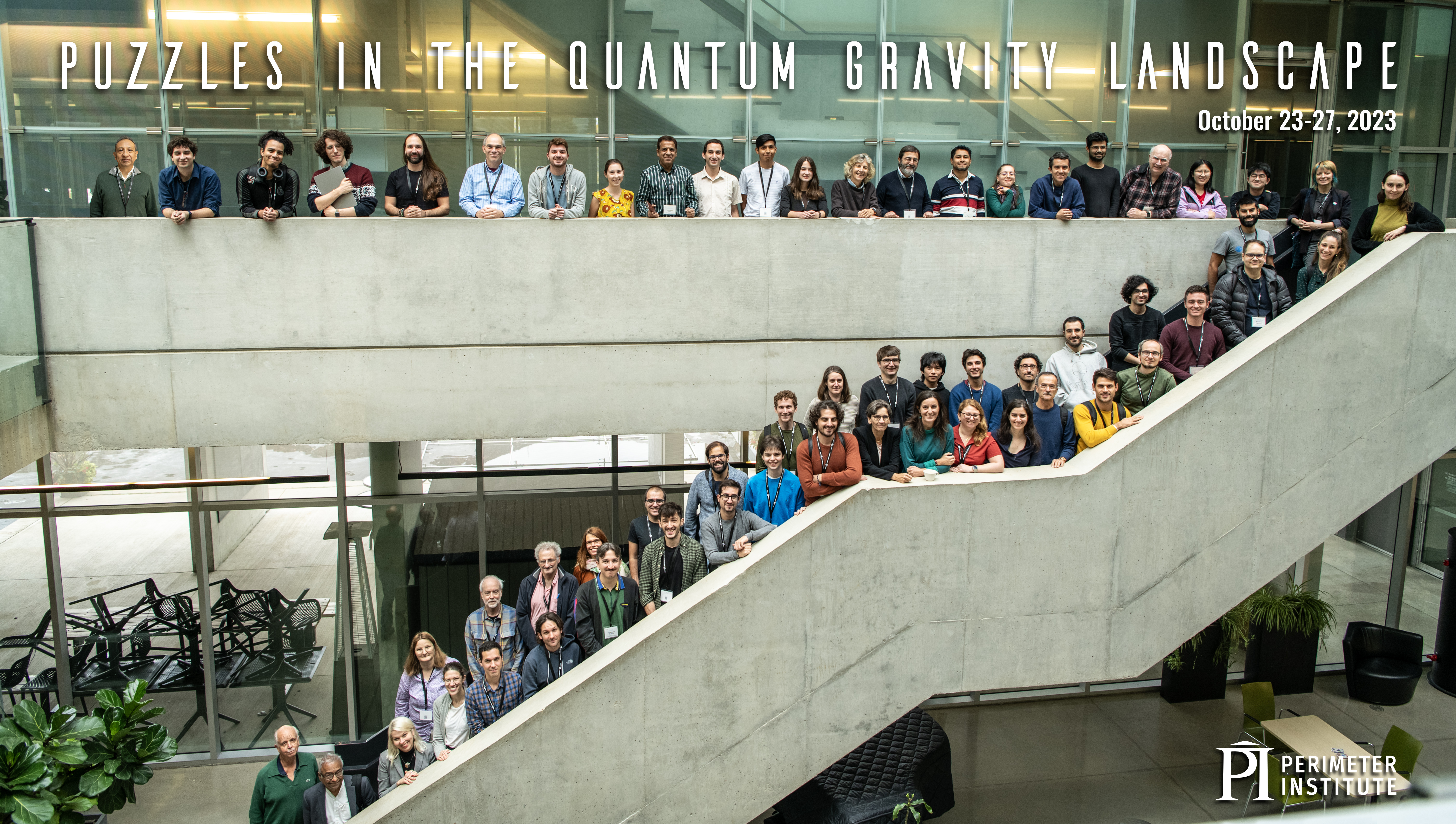
Territorial Land Acknowledgement
Perimeter Institute acknowledges that it is situated on the traditional territory of the Anishinaabe, Haudenosaunee, and Neutral peoples.
Perimeter Institute is located on the Haldimand Tract. After the American Revolution, the tract was granted by the British to the Six Nations of the Grand River and the Mississaugas of the Credit First Nation as compensation for their role in the war and for the loss of their traditional lands in upstate New York. Of the 950,000 acres granted to the Haudenosaunee, less than 5 percent remains Six Nations land. Only 6,100 acres remain Mississaugas of the Credit land.
We thank the Anishinaabe, Haudenosaunee, and Neutral peoples for hosting us on their land.
-
Quantum Simulators of Fundamental Physics
23 talks-Collection NumberC23019This meeting will bring together researchers from the quantum technology, atomic physics, and fundamental physics communities to discuss how quantum simulation can be used to gain new insight into the physics of black holes and the early Universe. The core program of the workshop is intended to deepen collaboration between the UK-based Quantum Simulators for Fundamental Physics (QSimFP; https://www.qsimfp.org) consortium and researchers at Perimeter Institute and neighbouring institutions. The week-long conference will consist of broadly-accessible talks on work within the consortium and work within the broader community of researchers interested in quantum simulation, as well as a poster session and ample time for discussion and collaboration
Territorial Land AcknowledgementPerimeter Institute acknowledges that it is situated on the traditional territory of the Anishinaabe, Haudenosaunee, and Neutral peoples.
Perimeter Institute is located on the Haldimand Tract. After the American Revolution, the tract was granted by the British to the Six Nations of the Grand River and the Mississaugas of the Credit First Nation as compensation for their role in the war and for the loss of their traditional lands in upstate New York. Of the 950,000 acres granted to the Haudenosaunee, less than 5 percent remains Six Nations land. Only 6,100 acres remain Mississaugas of the Credit land.
We thank the Anishinaabe, Haudenosaunee, and Neutral peoples for hosting us on their land.
-
Gravitational Waves Beyond the Boxes II
15 talks-Collection NumberC22013Gravitational Waves Beyond the Boxes II -
PSI 2019/2020 - Gravitational Physics
15 talks-Collection NumberC20004PSI 2019/2020 - Gravitational Physics -
PSI 2019/2020 - Relativity (Kubiznak)
15 talks-Collection NumberC19039PSI 2019/2020 - Relativity (Kubiznak)
